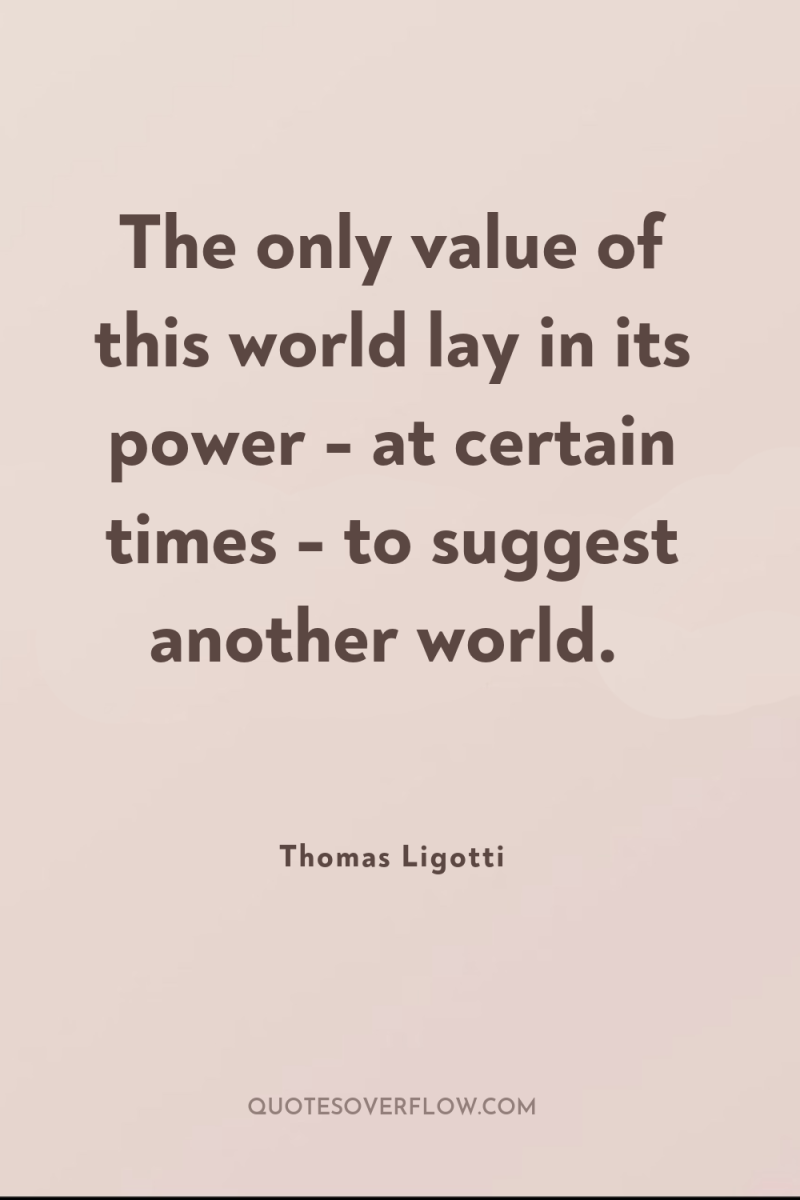1
And one thing we know is real: horror. It is so real, in fact, that we cannot be sure it could not exist without us. Yes, it needs our imaginations and our consciousness, but it does not ask or require our consent to use them. Indeed, horror operates with complete autonomy. Generating ontological havoc, it is mephitic foam upon which our lives merely float. And, all said, we must face up to it: horror is more real than we are.Thomas Ligotti

2
The only value of this world lay in its power - at certain times - to suggest another world.Thomas Ligotti
3
Life is a nightmare that leaves its mark upon you in order to prove that it is, in fact, real.Thomas Ligotti
4
Compassion for human hurt, a humble sense of our impermanence, an absolute valuation of justice–all of our so-called virtues only trouble us and serve to bolster, not assuage, horror. In addition, these qualities are our least vital, the least in line with life. More often than not, they stand in the way of one’s rise in the welter of this world, which found its pace long ago and has not deviated from it since. The putative affirmations of life–each of them based on the propaganda of Tomorrow: reproduction, revolution in its widest sense, piety in any form you can name–are only affirmations of our desires. And, in fact, these affirmations affirm nothing but our penchant for self-torment, our mania to preserve a demented innocence in the face of gruesome facts. By means of supernatural horror we may evade, if momentarily, the horrific reprisals of affirmation. Every one of us, having been stolen from nonexistence, opens his eyes on the world and looks down the road at a few convulsions and a final obliteration. What a weird scenario. So why affirm anything, why make a pathetic virtue of a terrible necessity? We are destined to a fool’s fate that deserves to be mocked. And since there is no one else around to do the mocking, we will take on the job. So let us indulge in cruel pleasures against ourselves and our pretensions, let us delight in the Cosmic Macabre. At least we may send up a few bitter laughs into the cobwebbed corners of this crusty old universe. Supernatural horror, in all its eerie constructions, enables a reader to taste treats inconsistent with his personal welfare. Admittedly, this is not a practice likely to find universal favor. True macabrists are as rare as poets and form a secret society by the bad-standing of their memberships elsewhere, some of their outside affiliations having been cancelled as early as birth. But those who have gotten a good whiff of other worlds and sampled a cuisine marginal to stable existence will not be able to stay themselves from the uncanny feast of horrors that has been laid out for them. They will loiter in moonlight, eyeing the entranceways to cemeteries, waiting for some propitious moment to crash the gates and see what is inside. Once and for all, let us speak the paradox aloud: “We have been force-fed for so long the shudders of a thousand graveyards that at last, seeking a macabre redemption, a salvation by horror, we willingly consume the terrors of the tomb…and find them to our liking.Thomas Ligotti
5
Compassion for human hurt, a humble sense of our impermanence, an absolute valuation of justice–all of our so-called virtues only trouble us and serve to bolster, not assuage, horror. In addition, these qualities are our least vital, the least in line with life. More often than not, they stand in the way of one’s rise in the welter of this world, which found its pace long ago and has not deviated from it since. The putative affirmations of life–each of them based on the propaganda of Tomorrow: reproduction, revolution in its widest sense, piety in any form you can name–are only affirmations of our desires. And, in fact, these affirmations affirm nothing but our penchant for self-torment, our mania to preserve a demented innocence in the face of gruesome facts. By means of supernatural horror we may evade, if momentarily, the horrific reprisals of affirmation. Every one of us, having been stolen from nonexistence, opens his eyes on the world and looks down the road at a few convulsions and a final obliteration. What a weird scenario. So why affirm anything, why make a pathetic virtue of a terrible necessity? We are destined to a fool’s fate that deserves to be mocked. And since there is no one else around to do the mocking, we will take on the job. So let us indulge in cruel pleasures against ourselves and our pretensions, let us delight in the Cosmic Macabre. At least we may send up a few bitter laughs into the cobwebbed corners of this crusty old universe.Thomas Ligotti